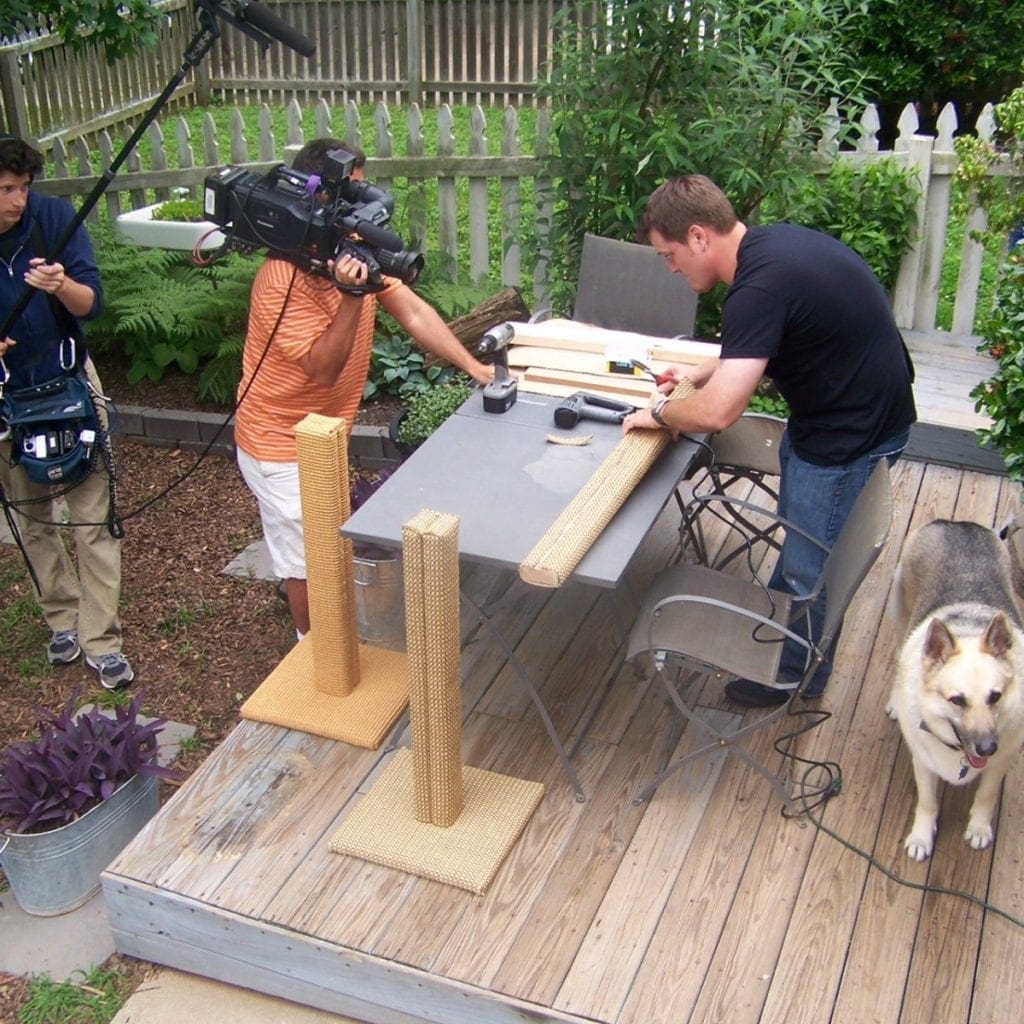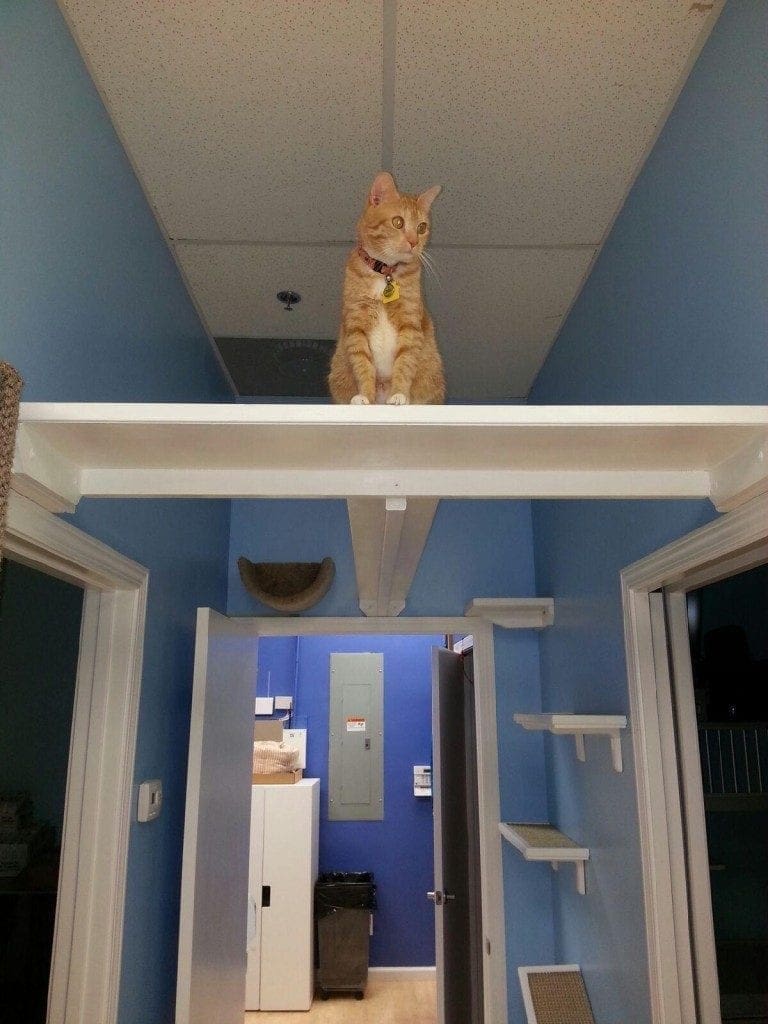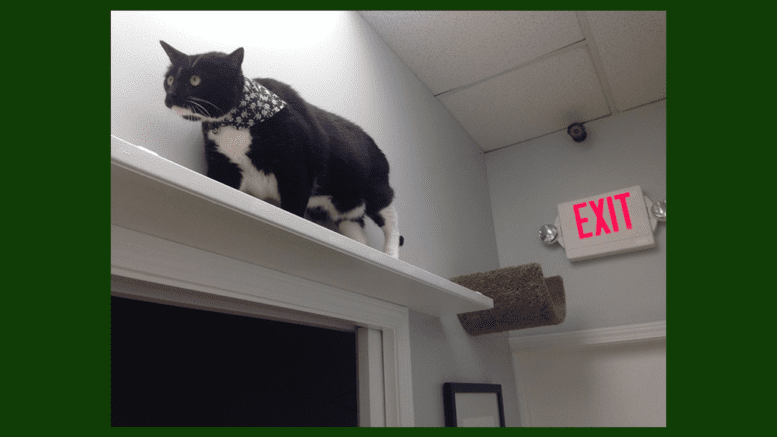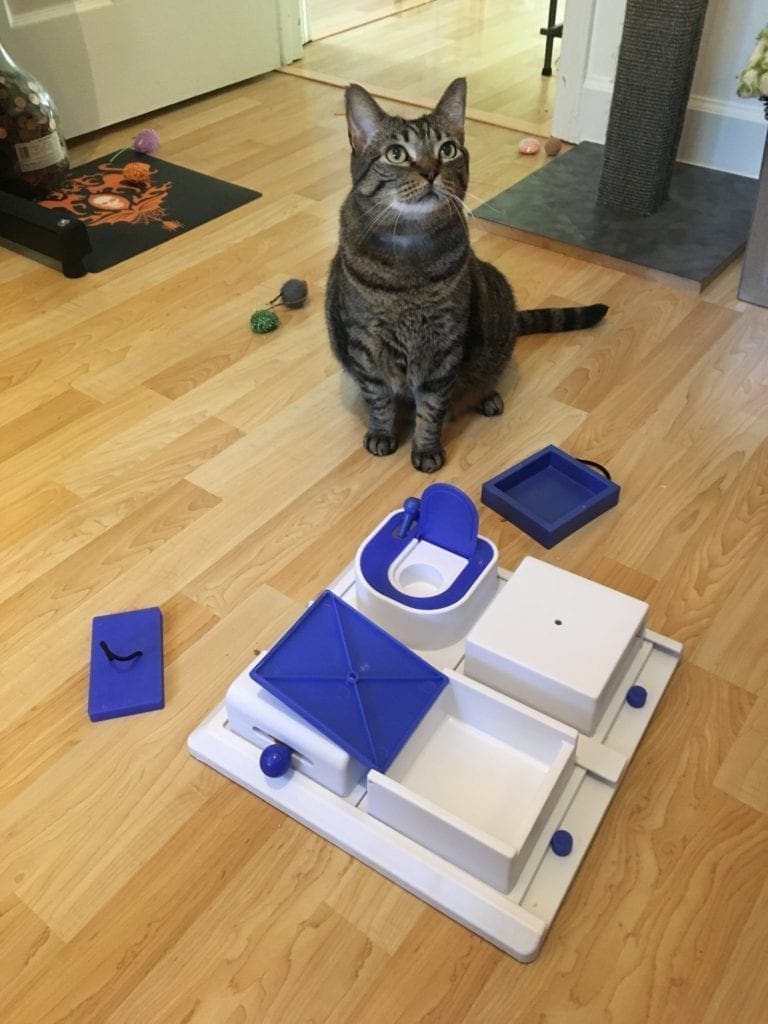Ingrid Johnson is very specific about her title – Certified Cat Behavior Consultant, certified by the International Association of Animal Behavior Consultants. In fact, she is the only IAABC-certified consultant specializing in cats in Georgia and she has been doing it since 1999.
While her consulting services are not limited to Cobb County, she works as a veterinary technician, groomer and office manager at Paws Whiskers & Claws in Marietta, a practice she helped Dr. Stephanie Globerman to open in 2006. She has been featured in Catster Magazine (formerly Cat Fancy), does speaking engagements, and was on an episode of Animal Planet’s “Cats 101.”
Johnson got an unexpected start in the animal business when she rescued a cat and took it into a local veterinary office to be spayed. They asked her if she wanted a job and she jumped at the idea.
“My mom was so upset. I had just graduated from art school, four-year degree, we’re paying off these students loans, and the next weekend I started as a vet tech,” Johnson said while laughing. “So I use my design degree in my home decor/vertical space designs.”

Ingrid with her cat Mamas. She adopted her and her litter of four. (photo courtesy of Ingrid Johnson)
The clinic put her in charge of adoptions, which is how she discovered her interest in feline behavior and what led to the consulting gig. She’s been doing house calls since 2006 in the metro area and beyond.
Over the years, she has built a loyal client base.
“We’ve known Ingrid since 2000,” Jill Butler said. “She has helped us to increase our understanding of some of the weird things cats do. Let’s face it, they are little weirdos sometimes and Ingrid can read their minds.”
Mark Sink said, “From diligently reading Ingrid’s social media posts, I’ve become a big believer in foraging toys, heavy duty scratching posts, and regular play time. And I’ve educated a few folks on not declawing. Cats aren’t nearly as mysterious after absorbing Ingrid’s teachings.”
Aggression and litter box issues are two of the biggest issues she deals with. According to Johnson, there are some very common mistakes by cat owners. In multi-cat households, there tends to be one spot for the cats to feed, which can be a source of stress. It’s better to spread out feeding spots. Hooded and small litter boxes can also cause stress, so she advocates for large boxes in open spaces. If a cat is scratching in a certain spot, that is a good place to put a scratching post. Additionally, the scratching post should be tall enough to allow for a full body stretch.

Ingrid Johnson’s husband Jake was filmed for Animal Planet while working on customized cat scratching posts. (photo courtesy of Ingrid Johnson)
“She taught us how many litter boxes were appropriate for our household given the number of cats we had and where to put them,” said client Natalie Nardone. “Just the placement suggestions stopped some spraying issues we were having with our older cat.”
Johnson’s website FundamentallyFeline.com also offers a wealth of information for cat lovers.
In 2016, she became a published author for the first time in the Journal of Feline Medicine by collaborating on a paper about the concept of making cats use their natural instincts to work for their food by foraging. She helped create the website FoodPuzzlesForCats.com to assist owners in finding the right commercially-made food puzzles or making their own from ordinary household objects.
“We really firmly believe that cats should hunt for their meals. My cats have not had bowls of dry food in 12 years, and I’ve had two front leg amputees, three toothless cats, I’ve had a blind cat and I’ve had a hind-end paralysis. They all have foraged for all of their food,” Johnson said.
“I remember being shocked when she said there was no need for bowls of food,” said client Malinda Apanay. “Milly weighed about 16 pounds when we started the transition. In about two year’s time, she dropped down to a very healthy and happy weight of 12 pounds…Once she started foraging for her food she became more social and outgoing.”
Johnson also espouses the importance of vertical space because it “allows the cats more usable territory, particularly in a small environment…it also just facilitates natural climbing behavior so they get to use their back claws. They climb up a six-foot scratch pole like they would a tree outside.”
Her husband Jake builds custom vertical space pieces for clients and for Java Cats Cafe’s two locations in Grant Park and Marietta Square.

Davis, a rescued cat who resides at Paws Whiskers & Claws, enjoys the ample vertical space in the office. (photo courtesy of Ingrid Johnson)
Additionally, Johnson works with an organization called the Paw Project. Dr. Jennifer Conrad formed it as an effort to educate the public about the “painful and crippling effects of declawing,” to abolish the practice, and rehabilitate cats that have already undergone the procedure. The organization actively pushes for legislation at community and state levels to ban the surgery. It has succeeded in having the declawing of wild or exotic cats banned in California, and declawing domestic cats has been banned in Los Angeles, San Francisco, and several other California cities, as well as Denver, Colorado. At their urging, both California and Rhode Island have enacted legislation banning landlords from requiring tenants to declaw their pets.
Johnson and Globerman are the co-directors for the state of Georgia but haven’t been able to find anyone who will carry the legislation here.
“It’s a cruelty,” Johnson says. “The veterinarians take an oath to do no harm, and yet this is a common practice that is done every day and makes veterinarians a lot of money.” Johnson’s clinic is a no-declaw clinic, however, they do repairs on cats who have had botched surgeries causing chronic pain.
“We recently had a great success story that we redeclawed and helped. His mom came in and showed us video of him making biscuits [kneading] for the first time since she’s had him. She’s had him for months, but his feet were too painful,” Johnson said.
Paw Project http://www.pawproject.org/
Fundamentally Feline https://www.fundamentallyfeline.com
Paws Whiskers & Claws https://pawswhiskersandclaws.com
Food Puzzles for Cats http://foodpuzzlesforcats.com/
>> For more cat-based journalism from the Cobb County Courier follow this link


What are seriously gorgeous cat that is! The scratching posts also look really well-made :)_